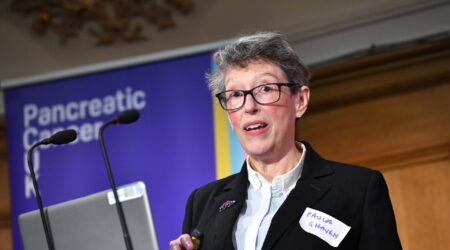

New tool developed to improve consistency in patient care
Specialist pancreatic cancer centres across the UK have started to trial a new tool to create consistency in decision-making for treatment and care for people with pancreatic cancer. The tool is called the Pancreatic Cancer Reporting Template (PACT-UK).
Our charity has been supporting a national team of pancreatic cancer specialists across the UK to develop this much-needed new tool. We are pleased to see an article about this being published in the prestigious scientific journal, the British Medical Journal, which we believe will help raise its profile and accelerate its adoption across the UK.
Why is this new tool needed?
Pancreatic cancer is tough to detect. And even once it’s spotted, people face huge obstacles in getting their diagnosis, treatment and care.
Sadly, 7 in 10 people with pancreatic cancer never receive treatment – not even chemotherapy. Due to the complexity of pancreatic cancer, it can be difficult for health professionals to make fast and effective decisions about a person’s treatment and care options.
One of the contributing factors for this was the lack of consistent ways of reporting findings from tests such as scans, which meant that different centres all approached this differently. As a consequence, treatment decisions could vary depending on where a patient was being treated.
How will the PACT-UK tool address this?
The PACT-UK tool aims to create consistency on reporting the size of the cancer, which will help create a standardised approach in decision-making for patients’ treatment, for example, in determining who is able to have surgery.
This will mean that health professionals can make better, faster decisions with more confidence going forwards, and that people can get the same treatment options wherever they are being cared for. We know this is crucial in ensuring people with pancreatic cancer have the best chance of surviving.
PACT-UK will also benefit research
The team who developed the PACT-UK tool are currently working with health professionals to use it in research studies, which will ensure a valuable resource for undertaking future research to improve treatment for pancreatic cancer patients.
As a result, there will be more consistent data that can be easily compared to allow for more effective research to improve diagnosis and outcomes for patients. We believe the adoption of this tool will also reduce challenges in researcher collaboration, helping researchers to share results more easily and potentially accelerating breakthroughs in pancreatic cancer research.
What does this mean for people affected by pancreatic cancer?
Implementing the tool has already resulted in:
- faster, better informed decision-making on treatment and care,
- safer surgery due to consistent and more detailed information about potential complications,
- clearer information for patients about their treatment options.
Ultimately, this has the potential to get more people into treatment quicker by speeding up decision-making and potentially increasing the shockingly low treatment rates we see today.
The tool has been endorsed by our Optimal Care Pathway expert group, including patient and carer representatives. It has also been welcomed by national health professional bodies, such as the Royal College of Radiologists and British Society for Gastroenterologists and Radiologists.
As a charity, we are calling for the PACT-UK tool to be implemented as a standard practice across the UK, as part of our vision for a faster, fairer, funded Optimal Care Pathway for people with pancreatic cancer.




